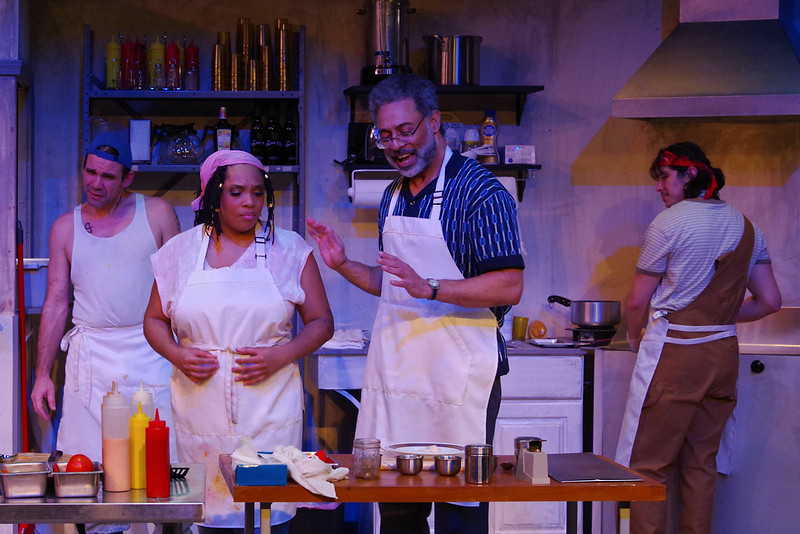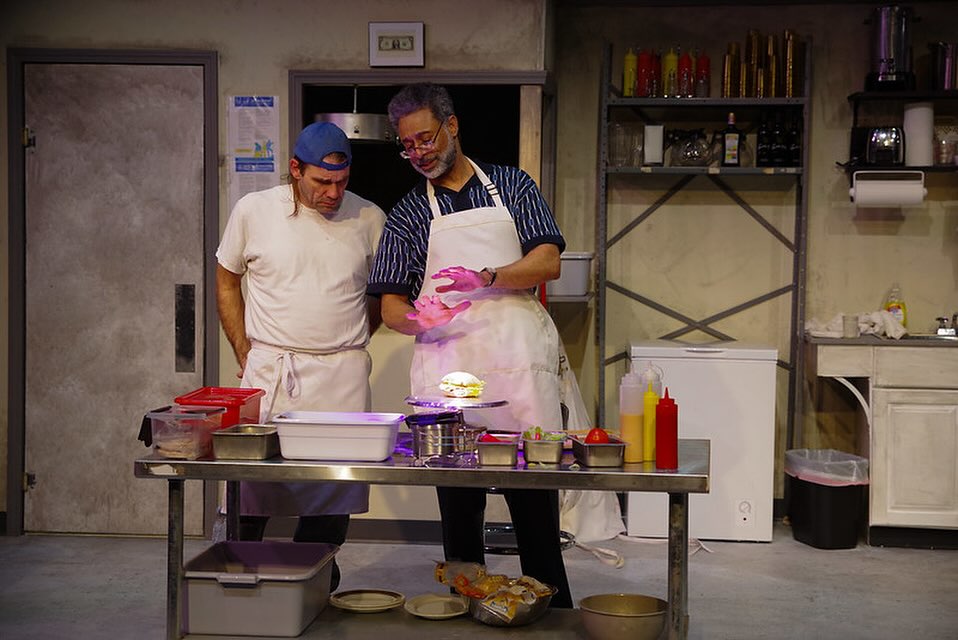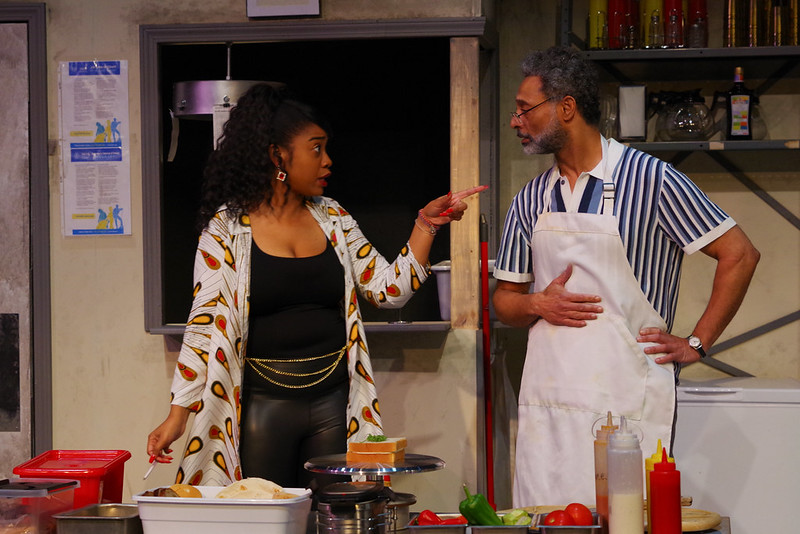After its 2021 debut on Broadway and subsequent publication, Lynn Nottage’s dark comedy Clyde’s became the most-produced play of the 2022-23 theatre season. All over the country, the play was performed by professional and amateur companies alike. With its infectious blend of ingredients, it’s easy to see why it was (and is) so popular.
The most recent production of the venerable Heartland Theatre Company in Normal, Illinois, Clyde’s invites its audience into an unassuming truck stop kitchen where, in spite of their modest surroundings, the cooks aspire to greatness. One of these is Letitia, a single mother frequently running behind and worried about childcare and her no-account ex. Another is Rafael, an exuberant and romantic grill man (or, as he prefers, sous chef) looking to prove himself (especially to Letitia). Their de facto leader and mentor is Montrellous, slightly older and brimming with life wisdom and sage advice. The pastime of this hard-working crew is daydreaming about and describing the perfect sandwich, each theoretical construction stacked with more sublime and specialized ingredients than the last.
Lording over this trio is the titular Clyde, a brassy badass of a boss if there ever was one. Clyde — a woman whose given name is never explained — berates the staff, undermines them, and harasses them in every sense of the word. Her zingers — and there are many — carry a sting, and her raison d’etre seems to be draining any hope at all out of her beleaguered workers.

Enter Jason, a new hire whose reticence to talk about himself might have something to do with the fact that he’s covered in jailhouse white supremacist tattoos in a kitchen where everyone else is a person of color. His initial reluctance quickly wears off, however, as he finds common ground with his co-workers. Everyone at Clyde’s has done time, we discover, and the kitchen staff shares a common goal of surviving in a society that views them as damaged goods.
The play is a pseudo-sequel to Nottage’s working class drama Sweat, in which battle lines are drawn during a factory strike in Reading, Pennsylvania. If you’ve seen Sweat, Jason will be a familiar character, as he was one of those warring workers whose actions landed him in prison. Having served his time, Jason now serves as a bridge between the plays. (I was especially interested in this element, having directed Sweat for Urbana’s Celebration Company back in 2018.) It’s an interesting choice, given that Clyde’s is so different in tone to its predecessor. Whereas Sweat is a hard-bitten working-class drama, Clyde’s definitely leans into the comedy and has a plot more akin to a network sitcom. (This isn’t a criticism, by the way. I mean, if Shakespeare can do it with Falstaff…. )
Regardless of whether or not the shift in tone from Sweat to sweet might be a bit jarring, Clyde’s can and should be allowed to stand on its own. As it is, performed by an endearing and talented ensemble, the delivery of the heartfelt emotion and broad comedy is masterful.
As Letitia, Chloe Szot delivers realness and warmth with every punchline, effortlessly conveying big laughs while never letting the audience forget the struggling young woman underneath the confident exterior. Likewise, Noe Cornejo Herrera skillfully balances over-the-top energy with a desperate yearning to be loved. His pursuit of Letitia, though a little undercooked in the writing, is still moving to behold.
Sean Henderson, whose work I enjoyed in Heartland’s production of Tiny Beautiful Things, delivers another smooth and charming performance as Montrellous. Described by a co-worker as “Buddha, if he grew up in the hood,” the character requires a blend of cool and grace, and Henderson gives plenty of both.
As Jason, Richard Jensen pulls off the tricky assignment of showing us the kicked puppy under his character’s edgy, discomfiting exterior. Thanks to his combination of world-weariness and tenderness, we can, at certain moments, see the goofy kid who grew hard in the previous play.
Finally, and most crucially, we have Ashley Daniels, who commands the stage in the same way that Clyde commands the kitchen. Daniels is a force of nature in the role, which is especially commendable given that Clyde, as a character, is given the least development in the text. Perhaps we should chalk this up to the inherent mystery of Clyde. Perhaps we’re not meant to know too much. But what we do know, thanks to Daniels, is that Clyde is The Boss.

Director Jason A. Vales has crafted a delightful and affecting show, eliciting loud laughs and sympathetic sighs. The tightness of his ensemble and the specificity of the technical elements are testament to a clarity of purpose that starts at the top. Well done, sir.
Speaking of technical elements, kudos are due to all the designers who worked on this show. From the grimy, lived-in kitchen (by scenic designer Jess Bradley) to the intuitive, emotional lighting (Jesse Folks); from the ubiquitous food props (Lynda Rettick) to the spot-on costumes (Melissa Hall Reynolds), everything works towards creating a coherent vision. Of key importance to this (and not to be too big a theatre nerd about it) are the scene transitions. In these dialogue-free, impressionistic moments between proper scenes, the cast beautifully flows from one moment to the next, guided by director Vales and aided by a slick and atmospheric sound design by Logan Neubecker.
It’s unfortunate that this review should appear after the show has closed; consider it an appreciation of what Heartland Theatre has done and an enticement to potential audience members to check out what they do next. (Heartland will announce its 2024-25 season in late May.) For, while there’s certainly no lack of theatre in Champaign-Urbana, it’s exciting to know that there’s plenty more high-quality theatre happening a short distance down the road.








